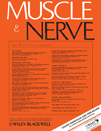 Complement activation at the neuromuscular junction is a primary cause of acetylcholine receptor loss and failure of neuromuscular transmission in myasthenia gravis (MG). Eculizumab, a humanized monoclonal antibody, blocks the formation of terminal complement complex by specifically preventing the enzymatic cleavage of C5. This was a randomized, double-blind, placebo-controlled, crossover trial in 14 patients with severe, refractory generalized MG (gMG). Of patients treated with eculizumab for 16 weeks, 6 of 7 (86%) achieved the primary endpoint of a 3-point reduction in the Quantitative Myasthenia Gravis (QMG) score. Examining both treatment periods, overall change in mean QMG total score was significantly different between eculizumab and placebo (P=0.0144). Assessing data at all visits, overall change in mean QMG total score from baseline was significantly different between eculizumab and placebo (P<0.0001). Eculizumab was well tolerated. These data suggest that eculizumab may have a role in treating severe, refractory MG.
Complement activation at the neuromuscular junction is a primary cause of acetylcholine receptor loss and failure of neuromuscular transmission in myasthenia gravis (MG). Eculizumab, a humanized monoclonal antibody, blocks the formation of terminal complement complex by specifically preventing the enzymatic cleavage of C5. This was a randomized, double-blind, placebo-controlled, crossover trial in 14 patients with severe, refractory generalized MG (gMG). Of patients treated with eculizumab for 16 weeks, 6 of 7 (86%) achieved the primary endpoint of a 3-point reduction in the Quantitative Myasthenia Gravis (QMG) score. Examining both treatment periods, overall change in mean QMG total score was significantly different between eculizumab and placebo (P=0.0144). Assessing data at all visits, overall change in mean QMG total score from baseline was significantly different between eculizumab and placebo (P<0.0001). Eculizumab was well tolerated. These data suggest that eculizumab may have a role in treating severe, refractory MG.
